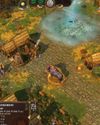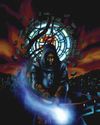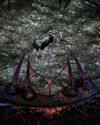
As a professor who studies the politics of games, I’m fascinated by the late 1990s. This period of massive technological innovation was also the crucible in which modern gaming culture was forged. When researching the era I sometimes encounter such an odd piece of gaming ephemera that I can’t resist tracking it down – like Lara Croft: The Art of Virtual Seduction, a book published by Prima Games in 2000. “Everyone knows how to make this tomb raider jump, shimmy and swim,” the ad suggested, “but do you know what makes her tick?” I did not know what made Lara tick, so I rushed to eBay to purchase a tattered copy. What arrived at my doorstep is a fascinating window into gaming at the turn of the millennium.
It’s difficult to overstate the impact Tomb Raider had in 1996. Riding the wave of early 3D gaming, Tomb Raider helped redefine the action-adventure platformer and spawned numerous copycats. Tomb Raider had something going for it that its imitators couldn’t match: Lara Croft.
VIRTUAL SEX SYMBOL
Today asking “who is Lara Croft?” would sound almost as absurd as asking “who is Mario?” Lara remains one of the most iconic characters in gaming history. But when Lara debuted, female protagonists were still quite rare - especially female action heroes. As a quippy gun-toting lead, Lara Croft occupied a space typically reserved for the Duke Nukems of the world. While the team at Core Design initially envisioned a male protagonist, the decision to change their hero into a heroine ended up dramatically shaping how Eidos would market the series.
This story is from the {{IssueName}} edition of {{MagazineName}}.
Start your 7-day Magzter GOLD free trial to access thousands of curated premium stories, and 9,000+ magazines and newspapers.
Already a subscriber ? Sign In
This story is from the {{IssueName}} edition of {{MagazineName}}.
Start your 7-day Magzter GOLD free trial to access thousands of curated premium stories, and 9,000+ magazines and newspapers.
Already a subscriber? Sign In

A New Dawn - The rise, fall and rise again of PC Gaming in Japan
The so-called 'Paso Kon' market (ie katakana's transliteration of 'Pasonaru Computa') in Japan was originally spearheaded in the 1980s by NEC's PC-8800 and, later, its PC-9800.

MARVEL: ULTIMATE ALLIANCE
Enter the multiverse of modness.

SLIDES RULE
Redeeming a hated puzzle mechanic with SLIDER

GODS AND MONSTERS
AGE OF MYTHOLOGY: RETOLD modernises a classic RTS with care

PHANTOM BLADE ZERO
Less Sekiro, more Wo Long: Fallen Dynasty

STARR-MAKING ROLE
Final Fantasy XVI's BEN STARR talks becoming a meme and dating summons

THIEF GOLD
Learning to forgive myself for knocking out every single guard.

HANDHELD GAMING PCs
In lieu of more powerful processors, handhelds are getting weirder

FAR FAR AWAY
STAR WARS OUTLAWS succeeds at the little things, but not much else shines

FINDING IMMORTALITY
Twenty-five years on, PLANESCAPE: TORMENT is still one of the most talked-about RPGs of all time. This is the story of how it was created as a ‘stay-busy’ project by a small team at Black Isle Studios